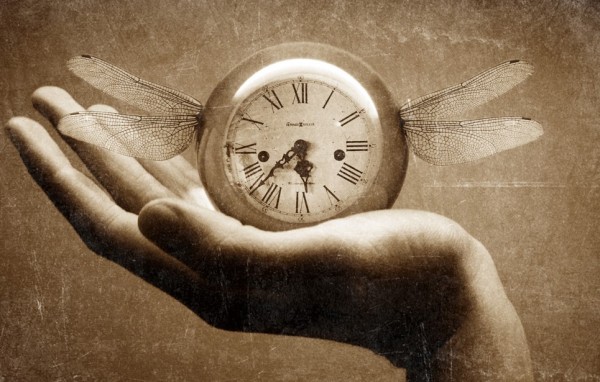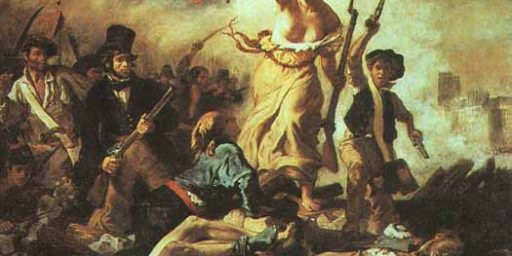History! What is it Good For?
Absolutely something!

Apropos of several recent posts (the most recent being Tulsa Historical Note), is this piece from the National Endowment for the Humanities’ magazine entitled Historians Disagree About Everything, or So It Seems. It is as least tangential to some of the recent discussions here in my posts on race and American history. I think the piece is also quite relevant to contemporary politics. It is worth a read in its entirety, but I have a few comments below.
Today they sound antique. But for most of our history Ben Franklin and Washington Irving stated the obvious—what pedagogues, parents, and students believed—that the study of history promoted love of country and built character. This belief permeated Webster’s Spellers, McGuffey’s Readers, and Longfellow’s “Paul Revere’s Ride.” It was enshrined in inscriptions carved on our public buildings. Etched along the top of the National Archives is “THE GLORY AND ROMANCE OF OUR HISTORY ARE HERE PRESERVED.”
Today we are wary of virtue and skeptical of glory, content to make history teachers “fix in the minds of youth” historical habits of mind: context, contingency, multiple causation, differing interpretations. History, many have concluded, is not a moral tale with inspirational value. If history is not a moral tale, what is it? How is the presentation of our colonial past and our American Revolution different? Why are there battles over the founding of America in the first place? How, since the 1960s, has the nature of history changed?
This is really a good general description of the conflicts we see when people like Ron DeSantis attack the AP African American Studies curriculum or the most fundamental element of conservative critiques of things like the 1619 Project. They want history to tell a specific tale, and it is a tale that is supposed to be more heroic than critical.
The problem, which I have been writing about, is that the more you delve into a more comprehensive view of the historical record, the messier the past gets. It certainly gets less heroic.
By the way, there is actually something to be said to have a set of national myths and values that we can rally around. But the construction and maintenance of those myths are a) not really history and, b) there is an important difference between national myths that create important social bonds and those which simply perpetuate preexisting power dynamics.
All nations want noble origins. So the founding of America, whose identity is based on ideals such as freedom and equality rather than on ethnicity and language, is particularly contested. Theodore Draper sees the coming of the American Revolution as a struggle for power over taxes and territory. Gordon Wood views it as a contest of ideas and a fight for rights. Robert Middlekauff titles his history of the revolution, The Glorious Cause. Alan Taylor emphasizes civil war, death by disease, and catastrophe for slaves and Native Americans in his 2016 book, American Revolutions.
[…]
Historians battle over the nature of history, the uses of history, and different interpretations of the past. They, along with teachers, publishers, and parents, also argue about how history is depicted to young people—whom they all agree are ignorant of the nation’s past. Progressive historians are opposed to myths and legends that nations have always used to unify and uplift themselves. In Founding Myths: Stories That Hide Our Patriotic Past, Ray Raphael reminds us that Paul Revere did not ride alone, that some soldiers at Valley Forge threatened mutiny and deserted, and that some American slaves fought for the British. Raphael is opposed to mythical history because it romanticizes war and emphasizes single causes, privileges individuals, and slights collective actions.
Not so, say traditionalists. History is about collective memory and national identity, which build unity and pride, encourage gratitude and civic engagement, and validate sacrifice in defense of our nation. “Romanticizing our past is something to be cultivated, rather than to be ashamed of,” argues Robert Kaplan. Ironically, one of the most effective defenders of mythological history was Charles Thompson, secretary to the Continental Congress, who decided to write secret memoirs of the American Revolution. He burned his account and his notes, giving this explanation: “I could not tell the truth without giving great offense. Let the world admire our patriots and heroes.”
I am largely of the position that the goal should not be to create heroes, but rather to learn the lessons that the past can teach, for good and for ill. And, moreover, for social scientists, the best we can often do in terms of gathering empirical data on human behavior is by looking at the past. As such, a clear-eyed view is essential.
Really, I should emphasize that last point. Part of why I am so insistent that we have as clear a view as possible of the past is that it is one of the few ways to find evidence for how various socio-political phenomena influence human behavior.
Something else to note that resonates with contemporary politics:
The battle over history is worldwide—since history is about national identity and can be wielded as a weapon in diplomatic disputes—and it will likely increase as nationalism intensifies.
Again, I recommend the piece in full.






Plato said his Republic needed a myth, a noble lie, in order to maintain a stable society. Modern conservatives believe the same thing, although many of them actually believe their various lies. And, as did Plato, they believed the lies must keep them on top. I don’t recall seeing Plato or anyone else talk about what happens when too many people see through the lies. Their solution, which they can’t be open about, is to, like DeSantis, try to enforce belief.
I’d prefer we grow up and deal with reality. But I do think Democrats need to come up with, not a myth, but a reality based unifying narrative.
Footnote. Plato wanted the Republic to encourage bravery in battle by recognizing state designated heroes. Such such designated heroes being entitled to demand sex from any citizen, male or female.
History should be the ongoing search for truth, and the teaching of history should be the transmission of what truths we find. There is plenty of room in actual history for heroes and heroines. Lincoln was certainly a racist by modern standards, but he saved the nation. Churchill was an imperialist as well as a racist, but he saved the world. Both Right and Left are eager to dismiss any historical figure who can be found to be flawed, but that’s a terribly ignorant attitude since I have it on good authority (Jesus?) that all are sinners. It’s of a piece with the general inability of the American mind to handle anything beyond Good/Evil, or even less felicitously, My Side/Your Side binaries.
By ‘the truth’ I don’t mean some programmatic distortion or over-emphasis on certain facts to produce the desired ‘moral of the story.’ Alternate history fiction is legitimate, but to my mind only when it treats the actual history honestly. Without grounding in history such fiction is really just fantasy and sheds the aura of realism that comes with good historical fiction.
The Aubrey/Maturin books by Patrick O’Brian are excellent examples. There was no Captain Aubrey. There was, however, a Captain (later admiral) Cochrane. Ditto George MacDonald Fraser’s books (there was no Flashman) and Bernard Cornwell (no Uhtred son of Uhtred). Historical fiction, perhaps surprisingly, can be an excellent way to teach history.
I’ve only written historical fiction once (in any depth, setting aside time travel romps and such) and would love to do it again. I enjoyed the hell out of the research phase, and the writing as well. Maybe in the adult space since there’s no way for my particular demographic to write about American history in the YA market.
Why study history? Because it’s there. Seriously, why study art, literature, languages, music, anything? Because I want to, that’s why.
Except we need heroes, as surely as so many people need one or more gods in their life. We need someone to aspire to be as good as. We need stories.
You might not, but you would be an outlier.
I think that’s true of the Great Men, absolutely. Jefferson raped his slaves. Washington had dentures of human teeth. Jackson was Jackson. A lot of the people around the founding of this country were awful, terrible people, as you would expect from a country founded on white supremacy (even in the north, where there were fewer slaves, you had Indians being regarded as savages)
Were there any decent human beings involved in the founding of our country? Even flawed, but good people? It’s a tough nut to crack.
But, I would say that begins to change when we get to beginning to address the inequities in our founding. Lincoln was a bit of a bigot, but did great things and personally grew at the same time.
And, I would say that the country we recognize was born more in the 1860s than the 1770s. The reconstruction Amendments changed America at a fundamental level, in a way that is glossed over in our schools, the same way that the Articles of Confederation are glossed over and it is basically taught that in 1776 the nation sprang up fully formed. (Seriously, what percentage of Americans even know about the Articles of Confederation?)
I’m not sure where I’m going with that, but we could have a more accurate, better myth about the Founding of America that provides better heroes. It might just have to start with Lincoln, and regard the first four score and seven years as a failed experiment.
The dual purposes of history don’t have to be in complete tension.
Do the English think that the Magna Carta made everything perfect? Or was it just an important stepping stone? I’m wondering how other countries treat their founding myths.
@CSK: Sure. But in the school setting–where most of the studying outside of “because I want to” hobbyist happens–the rub comes when “I don’t want to.” A nation that is going to attempt to keep children in school for upwards of 16-18 years is going to need a better set of rationales. (And a better approach to selecting what to include as well as when, why and to what ends.)
@Gustopher: Although me to clarify. I agree we need heroes and stories (and myths and legends, etc).
When I say “I am largely of the position that the goal should not to be create heroes, but rather to learn the lessons that the past can teach, for good and for ill.”
I mean the goal of the study of history itself/the teaching of history.
I am picking a side in the contrasting visions in the quoted passage.
(I also note a typo in my text).
@Just nutha ignint cracker:
Yeah, I know. It’s probably an insoluble problem. How do you teach people who don’t want to learn? Beats me.
@CSK:
I happened to mention in comments a couple days ago that a few decades ago the annual convention of historians, whatever they call their association, had their annual convention and their usual vote ranking presidents. Somebody, IIRC Gary Wills, took the list and asked what most of the top rated prezes had in common. He came up with two key things. One was a career in politics, learning how to get stuff done and letting everybody get a piece of the pie. Two was a professional or serious amateur interest in history. History gave them perspective, some idea of what was desirable and what was possible. I don’t know how to talk or think about politics, or governance, without some awareness of history.
@Steven L. Taylor: Does the selection of heroes have more or less impact going forward than understanding all the details of the movements?
History is, as you note, messy. There are lots of narratives that can be pulled from it that are wildly contradictory. The life and works of Thomas Jefferson alone show that — from “all men are created equal” to owning slaves, from “endowed by their Creator” to rewriting the Bible to remove the divinity of Christ… the man’s a mess.
But that’s a high school or college level mess, and most Americans effectively have an 8th grade education.
For better or worse, the teaching of very basic history at the level of myth has a lot more impact than, say, a careful examination of the ability of a slave to consent (if Sally Hemings were more difficult than a different slave, would Jefferson have beaten her, and then moved on? Is that some degree of acquiescence if not consent? Did slaves shown favor feel kindly towards their owners?)
The writing of history is of greater importance than the research of history. And there will always be charlatans trying to write history so the abuses they want to perpetuate are justified.
In that context, I think it is the job of reasonable historians to try to create better heroes, leaving the messy bits for college and grad school.
Use the messy ambiguity to tell a story we can be proud of and that leads to better things, rather than get bogged down in nuance.
“The Jews as a whole didn’t kill Christ, it was a small group of conservatives, collaborating with the occupying powers, trying to maintain their privileged second-tier status…” doesn’t help anyone with a poor education.
@gVOR10:
I don’t know how one thinks about those things without some knowledge of history, either. What I do know, from years of experience, is that you cannot teach those who don’t want to learn.
“History teaches us that we seldom learn much from history”
IMO it doesn’t give much specific wisdom, still less actionable information; perhaps more a sense of perspective. Human being are a querulous, and often self-seeking bunch.
But also capable of impressive achievements, and both material and ethical progress.
@gVOR10:
Churchill being a rather competent amateur historian, for one.
His history of the life of Marlborough is regarded well even by a lot of professionals.
Made rather a lot of money out of historical writing, as well.
Always loved his remark:
@Gustopher:
Ben Franklin?
Tom Paine, who was not an active player, but quite significant as an ideologist?
Benedict Arnold, who recognised the terrible mistake? *ducks and runs*
Going straight to the bottom line, I find a quote attributed to Oscar Wilde to be most apt: Experience is simply the name we give our mistakes.
History is a lot more than that. But the most valuable aspect, IMO, of studying it, is the very large collection of mistakes and blunders one can learn from. Whether mae by good people, bad people, people who meant well, etc., nothing is as valuable as learning from other’s mistakes.
@Gustopher:
False narratives are not required to create a simplified story for various levels.
“George Washington is called the Father of our Country because he commanded our armies during the revolution and was elected our first president. He was a great man, but not without faults, especially the fact that he owned slaves, which is a terrible thing.”
“Richard Nixon was our 37th president. He did some good things, for example beginning to talk to China which had been an enemy. But he was a dishonest and unscrupulous man and was impeached and in the end resigned after he was shown to be involved in several crimes.”
Young people are not morons, given the opportunity they can understand nuance. It’s the adults who have the problem. I’ve been ‘nuancing’ 10 year-olds and 14 year-olds for three decades. Isn’t really hard, but you do have to start from a position of respecting the reader of whatever age, and devoting yourself to the truth. I refer you to this farewell letter to fans. Not only can you nuance them, you can bitch out the ones who don’t get it. And BTW, unlike history texts, our kids had to spend their allowances to read. And about a million a month, did. (Thanks for the house!)
History, is interesting. Precisely because of all the unexpected twists and turns it takes. Those are the very life blood of it. How boring history would be if it plodded boringly along A-B-C-D-E-F-G-H… X-Y-Z. Instead it is ABDKDFLDKJSWOLALDOGFCXCNDJRLTFRERWN, never reaching Z.
And all those twists and turns add up to the story of man.
@Gustopher:
Personally, I thenk the Adamses (Samuel, John, and John Quincy) are a fairly decent bunch. I don’t think I’d enjoy sitting down to chat with John, but I still think he’s a decent man.
I also think Benjamin Franklin was a reasonably good man.
@JohnSF:
I think Benedict Arnold was probably the best military leader on either side during the war. If he hadn’t been there, it’s questionable whether we would have captured Fort Ticonderoga. He was responsible for winning the Battle of Saratoga and Congress really should have treated him as the hero he was. His contributions to American independence are significant. If he’d stayed loyal, he would have been one of the greatest heroes of the war. Instead he’s synonymous with traitor. So it goes.
@Michael Reynolds:
This.
All human beings are human, and as such subject to the normal flaws of humans, and grounded in their own historical and social situation.
In US history two of my “idols” (I don’t really do idols) are Lincoln, the man who perhaps more than any any other, set the conditions for the preservation of “Western Civilization”, but was also ambivalent about African-American equality.
And Truman, who set the course for combining “de-imperialization”, the economic recovery of Europe and its resistance to Soviet hegemony, and global political and economic stabilization.
But was also the product of the cesspit of corruption that was the Pendergast Machine.
Maybe Clem Attlee and Ernie Bevin are less flawed; but perhaps also less monumental, internationally. Though, Attlee on the quiet, was maybe more significant historically than he gets credit for.
See also: Gandhi, de Gaulle, Adenauer, Gorbachev, etc etc etc
The strength of studying history is as Taylor writes, to learn from history.
As opposed to using history as a moral fable wherein we sit in judgement of historical figures and sort them into piles of heroes and villains.
And this goes also for the liberal instinct to condemn figures like Jefferson who were slavers. There isn’t any value in simply wagging our finger at him and toppling a statue. Its not wrong, just unhelpful, and doesn’t offer us much guidance for our own time and behavior.
The value comes when we study our own behavior, and look for our own flaws. For example, are there similarities to ourselves and Jefferson, who wrote beautiful flower prose extolling how all men were equal, as his slave brought him a cup of tea?
Our instinct is to protest, but everyone here, myself included is reading this on an electronic device made in part by slaves around the world. The astonishing wealth of modern society is built on the backs of slaves.
How much of our globalized wealth are we willing to part with, to abolish slavery?
The point is, there is no easy or simple answer to the ethical dilemmas we face today, because it was the same for Jefferson. The dilemmas he faced were as complex and difficult as ours. He made decisions, we can now make ours using the knowledge we have of his.
“To be ignorant of what occurred before you were born is to remain always a child.”
― Marcus Tullius Cicero
Perhaps the worst format for teaching history is the dates/events/memorize those because that’s the test! sylibus. Unfortunately the one most common. To make it interesting to younger folks, there has to be a lot of cause/effect. WTF were those people thinking?? –that’s where all the fun is an 90% of the usefulness. If history is to be of use it must teach us about ourselves and we are mighty strange critters. Something most teenagers are aware of…if perhaps only in the form of their general angst.
There’s an old series by a very smart prof who does an excellent job with the latter. The Western Tradition by Eugene Weber.
The history books I read as a youth lied to me on objective truth and were designed on purpose to get me to side with one over the other. History class was often barely vaguely hidden state propaganda.
It was obvious. We were always the good guys. That’s not how reality works. My textbooks were omitting many facts and accentuating convenient ones. I was being spoonfed state propaganda labeled as history about the Revolutionary War, about slavery, the Civil War, etc.
When I matured enough to know what was happening, I was extraordinarily pissed off these folks / that system was in charge of my education.
I got a shitty, sub-par early education due to parochialism paid for by citizens’ tax dollars.